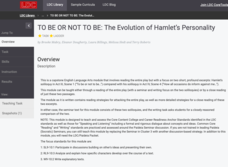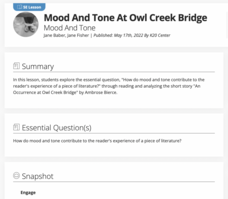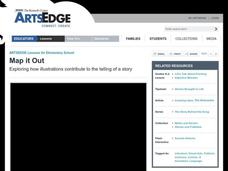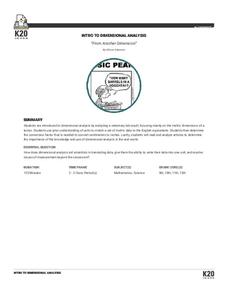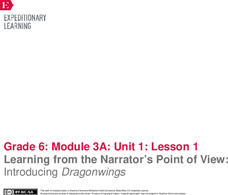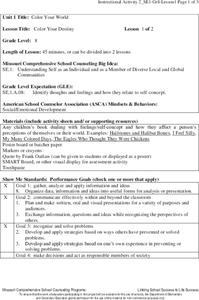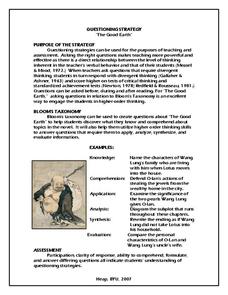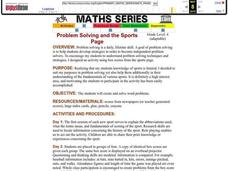Novelinks
Man's Search for Meaning: ReQuest Procedure Questioning Strategy
As part of a study of Viktor Frankl's Man's Search for Meaning, class members respond to, and craft, higher-level comprehension questions based on passages from the text.
EduGAINs
Data Management
Using a carousel activity, class members gain an understanding of the idea of inferences by using pictures then connecting them to mathematics. Groups discuss their individual problems prior to sharing them with the entire class. The...
K20 LEARN
Things Are Lit at Thornfield: Jane Eyre
Jane Eyre offers scholars an opportunity to practice reading comprehension skills. Pairs are assigned a word from the text, use their prior knowledge, and consider the context, connotation, and denotation of the word to posit a...
Literacy Design Collaborative
To Be or Not to Be: The Evolution of Hamlet’s Personality
How does Hamlet's state of mind change over the course of Shakespeare's most famous revenge tragedy? After a close reading of Hamlet's soliloquies in Act III, scene 1 and Act IV, scene iv, class members engage in a Paideia/Socratic...
K20 LEARN
That Which We Call a Rose: Connotation and Denotation in Romeo and Juliet
Words carry weight. And some words carry baggage. Scholars learn the difference in a study of connotation and denotation. Individuals sort the cards into three groupings using words from Shakespeare's play. After sharing within groups,...
K20 LEARN
Mood and Tone at Owl Creek Bridge: Mood and Tone
Two versions of movie trailers for the film Mary Poppins launch a supercalifragilisticexpialidocious lesson about how mood and tone impact a reader's experience of work. Using the provided list, readers identify the words that create the...
Curated OER
QAR: Question Answer Relationships with an example from Canyons by Gary Paulsen
As you're reading Gary Paulsen's tale of self discovery and adventure, Canyons, bring this questioning strategy into your classroom. The QAR questioning strategy is meant to encourage a deeper analysis of the text, as some questions are...
EngageNY
Reading for Gist and Analyzing Point of View: Moon Shadow
Character analysis isn't always earth-shattering. Using a graphic organizer, pupils analyze Moon Shadow's point of view following the earthquake in Laurence Yep's Dragonwings. Also, scholars co-create an anchor chart showing the...
EngageNY
Reading for Gist: “Middle Ages” Excerpt 1
Dig deep. Scholars dig deep for meaning while reading Middle Ages Excerpt 1. They begin by finding unfamiliar words and adding them to a word catcher. Pupils then take a close look at adversity in the text and complete an anchor chart.
Curated OER
Map It Out
Explore how illustrations add to a story. Young learners will look at picture books to see how the pictures tell the story. They create illustrations to go with a chosen story, and then flip the activity so they have to write a story to...
K20 LEARN
From Another Dimension: Intro To Dimensional Analysis
Hold measurements to a different metric. Class members convert the measurements of a dog's tumor to explain the size to its owner. Using cards, learners match metric measurements with their English equivalents. They then read articles to...
Core Knowledge Foundation
Unit 8: Treasure Island
Treasure Island by Robert Louis Stevenson is the focus of the final unit, emphasizing reading, writing, grammar, morphology, and spelling. Fourth graders read and discuss a chapter with every lesson, followed by word work—prefixes,...
Curated OER
Mississippi Trial, 1955: A Request Strategy for Questioning
Knowledge, comprehension, application, analysis, synthesis, evaluation. Class members use Bloom's taxonomy to craft six levels of discussion questions for Chris Crowe's novel, Mississippi Trial, 1955. Model questions from Chapter 3, a...
EngageNY
Learning from the Narrator’s Point of View: Introducing Dragonwings
Journey into the past with Laurence Yep's Dragonwings. Scholars complete anchor charts to analyze techniques the author uses to develop the narrator's point of view in his novel. As they read, pupils also complete word catchers to track...
Virginia Department of Education
Weather Patterns and Seasonal Changes
Get your class outside to observe their surroundings with a lesson highlighting weather patterns and seasonal changes. First, learners take a weather walk to survey how the weather affects animals, people, plants, and trees during...
Missouri Department of Elementary
Color Your Destiny
Class groups bring feeling words alive by creating a poster that illustrates with images and colors, but not words, the feeling conjured by the word. The posters are then combined into a mural for the classroom wall.
Novelinks
The Good Earth: Questioning Strategy
Readers use Bloom's Taxonomy to create multi-level questions about Pearl Buck's The Good Earth.
California Education Partners
Glass Menagerie
As a reading comprehension assessment, ninth graders are asked to use evidence drawn from The Glass Menagerie to support an analysis of how Tennessee Williams uses specific lines to develop Amanda's character as well as her relationships...
Curated OER
Problem Solving and the Sports Page
The use of box scores from baseball games is the foundation of this math lesson. Organize your class into groups of four, and give identical box scores from a baseball game that was just played. Have them create word problems from the...
Scholastic
Presenting Persuasively (Grades 6-8)
Teens and pre-teens are a prime target for advertisers, so how are they doing it? An interactive activity highlights the strategies used by advertisers, such as visual imagery and verbal clues. Then, a short writing assignment puts those...
Education Bureau of Hong Kong
Traditional Marketing and E-Marketing Strategies
Are e-marketing or traditional marketing promotions more effective in business? Scholars explore the topic as they discuss and debate e-commerce. To finish, they develop marketing plans to demonstrate learning.
New York City Department of Education
Colonial America and The American Revolution
How did the founding of the American colonies lead to a revolution? Use the essential question and sample activities to guide learners through a series of history lessons. Additionally, the packet includes effective strategies to...
K20 LEARN
The New Colossus: Determining Author's Perspective
Introduce young scholars to the concept of the author's perspective with a lesson that uses Emma Lazarus's poem, "The New Colossus," as the anchor text. Groups use a T-chart to identify words that reveal the author's point of view of The...
University of Texas
Matter and the Periodic Table Chemical Families and Periodic Trends
Is assembling the periodic table as simple as Tetris? Scholars arrange colored cards into a logical order and then make connections to the arrangement of the periodic table. Hands-on activities include adding trend arrows and analyzing...





